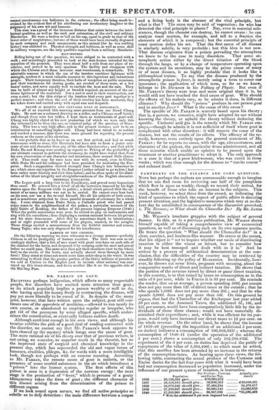MR. PARKIN ON GOUT.
EXCEPTING perhaps indigestion, which affects so many respectable people, few disorders have excited more attention than gout ; as its attack popularly implies a person wealthy or well to do, who having spent his money freely in contracting the disease, will pay yet more liberally to be cured of it. In despite of the many pens, however, that have written upon the subject, gout still con- tinues one of the opprobria of medicine,—allowed to run nearly its own course, or abandoned to empirics regular or irregular, who get rid of the paroxysm by some alleged specific, which under- mines the constitution, or eventually induces sudden death. Although confident enough in his own views, and although his treatise exhibits the pith of a good deal of reading connected with the disorder, we cannot say that Mr. PARKIN'S book appears to have cleared up the mystery which hangs over the cause of gout. The more rational air of his theory over that of previous writers, is not owing, we conceive, to superior merit in the theorist, but to the improved state of surgical and chemical knowledge in the present day, which has superseded the old and vague terms of humours, crudities, phlegm, &c. for words with a more intelligible look, though not perhaps with an exacter meaning. According to Mr. PARIUN, the remote cause of gout is malaria, or the presence of some morbid substance in the air which introduces a
"poison" into the human system. The first effects of this poison is seen in a depression of the nervous energy : the next stage is the production of "fever," which in persons of a gouty idiosyncracy takes the form of gout ; the different character of this disease arising from the determination of the poison to different organs. If we look round upon nature, we find all active principles so subtile as to defy detection : the main difference between a corpse
and a living body is the absence of the vital principle, but what is that ? The same may be said of vegetation; for who has detected the vital principle in plants ? Nay, even in material sub- stances, though the chemist can destroy, he cannot create : he can analyze roast mutton, for example, and tell to a fraction the elements of which it is composed ; but the essential principle of roast mutton defies his art. That the first cause of all disease is similarly subtile, is very probable ; but this idea is not new. That disease originates from a poison pervading the atmosphere we know to be the case in many disorders. That some at- mospheric action either by the direct vitiation of the blood through the lungs, or by a change of temperature operating upon the system and its secretions, may be the prime cause of many or of most dieases, is so highly probable that it looks like a philosophical truism. To say that the disease produced by the atmospheric poison is fever, is merely using a term to cover our ignorance ; the application of which term, so far as we know, belongs to Dr. DICKSON in his Fallacy of Physic. But even if Mr. PARKIN'S theory were true and more original than it is, be would still not have reached the final cause of gout. Why should the effects of his malaria vary, as he admits it does, in different climates ? Why should the " poison" produce in one person gout and in another fever ? What is the cause of this cause ? The specific of Mr. Pasant is scarcely based upon his theory ; that is, a person, we conceive, might have adopted its use without knowing the theory, or upheld the theory without deducing the specific. Carbonic acid as is the remedy which Mr. PARKIN em., ploys,—though he admits it is not sufficient of itself where gout is complicated with other disorders : it will remove the cause of the disease, but not the results of its effects. The efficacy of the re- medy, however, rests entirely upon the general statement of Mr, PARKIN ; for he reports no cases, with the age, circumstances, and character of the patient, the particular doses administered, and all those minutite which enable an opinion to be passed upon the treatment or another practitioner to adopt it. The only approach to a case is that of a poor Irishwoman, who was cured in three weeks; which was time enough for the disease to " run its course " and exhaust itself.


























 Previous page
Previous page